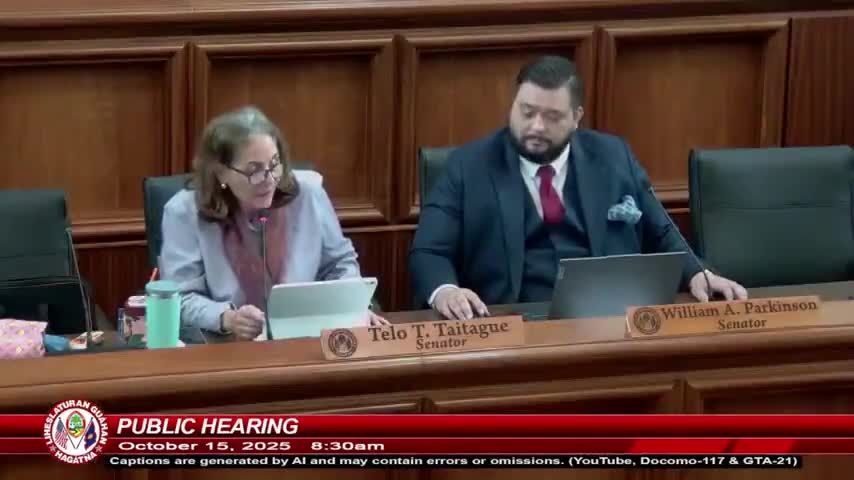Committee hears bill to criminalize nonconsensual deepfake intimate images and expand victim remedies
Get AI-powered insights, summaries, and transcripts
Subscribe
Summary
Bill 171-38 would criminalize creation, possession, and distribution of nonconsensual intimate depictions, including AI-manipulated 'deepfakes.' Authors and supporters said the bill closes legal gaps, while Judiciary flagged potential duplication with existing protections and agencies urged continued review.
The Guam Legislature committee on Economic Investment, Military Build Up, Regional Relations, Technology, Regulatory Affairs, Justice, Election, and Retirement held a public hearing Oct. 15 on Bill 171-38 COR, titled in testimony as the Nonconsensual Intimate Depictions Act of 2025, which would criminalize the creation, possession and nonconsensual distribution of intimate images whether authentic or digitally manipulated.
Senator Will Parkinson, the bill's author, told the committee the measure was drafted to address "the newest frontier of exploitation, AI generated deep fake abuse," and to close gaps in existing law that can leave victims without remedies when images are fabricated. "This legislation ... modernizes Guam's criminal and civil codes to respond to a danger that didn't even exist even a few years ago," Parkinson said, adding the measure would create felony penalties, civil remedies, victim-privacy safeguards and forfeiture authorities for offenders.
Parkinson said the bill was drafted with input from national advocates and noted that RAINN (the Rape, Abuse & Incest National Network) expressed support. He cited international examples of youth-targeted harms and said jurisdictions including Australia and South Korea have reported significant youth victimization tied to AI-manipulated images.
Jane Flores, director of the Bureau of Women's Affairs, testified the bureau supports Bill 171-38 and called out the bill's provision treating possession or dissemination of manipulated child sexual depictions in the same manner as authentic child sexual abuse material under applicable Guam law. She also noted federal grant opportunities from the U.S. Department of Justice's Office on Violence Against Women (OVW) that could fund local efforts to prevent and respond to cybercrimes against individuals.
Judiciary of Guam submitted written comments saying courts already provide mechanisms to protect privacy interests, including sealing and restrictions of court records, and warned that "certain provisions of this bill may duplicate existing procedures." The committee discussed whether the bill's approach should amend existing chapters (for example, title 7, chapter 53) or add new chapters as drafted, and Parkinson said his broader AI task-force work may produce additional recommendations.
The Bureau of Budget and Management Research (BBMR) provided written comments noting that, for this bill, the Office of the Attorney General determined there was no fiscal impact and that the measure is administrative in nature. Committee members asked whether the bill should include language that would require online services to remove content; Parkinson and committee members said platform-removal language and other technical matters could be considered in markup or in follow-up bills.
No formal vote was taken on Oct. 15. Chairwoman Senator Tello Tiedegui recorded the bill as having been publicly heard and said the committee will accept additional written testimony for five business days and continue outreach to invited agencies and nonprofits for the markup stage.
